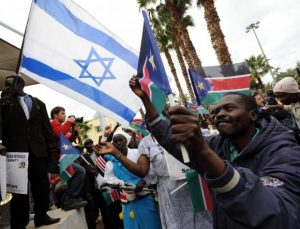An open society or a tribalist one? Israelis will have to choose

South Sudanese refugees demonstrating
Roni Dorot writes in +972, “Roni Geffen’s short film, Divine Daycare, portrays an exercise in tribal solidarity, as well as an exercise in social solidarity beyond tribal bonds. The film follows the story of a kindergarten for refugee children in south Tel Aviv after Israelis threw six Molotov cocktails and torched it. It is deeply moving and touches raw nerves. One might say – and justifiably so — that it is not difficult to elicit emotion when the camera focuses on a sweet, smart girl named Lula and her teacher, named Blessing, who perceives her role as far greater than just a kindergarten teacher.”
“Still, the film is smart because it is effective, revealing a world unknown to most Israelis — in their own backyard. And why should a film to be effective? To spur social change. An effective documentary confronts a society with something that it prefers to ignore, raises emotions it would rather repress, and thus forces members of that society to identify with those to whom fate has been less kind. Hence its crucial importance, as well as that of the Solidarity Film Festival where the film was screened in Tel Aviv’s Cinematheque.”…
“In a contrasting scene, Geffen draws on archival footage of now-minister Miri Regev inciting local residents against Sudanese and Eritrean refugees, shouting, “the Sudanese are a cancer in our bodies.” Regev externalizes the moral choices Israeli society faces: between an open society, characterized by cross-group social and a closed, tribal society.” (more…)
